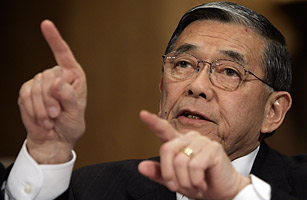
"Be as reasonable as you can." Those were Franklin D. Roosevelt's words of caution after approving the internment of Japanese-Americans during World War II. From 1942-1945, more than 100,000 Japanese-Americans were placed in internment camps out of fear they might side with Tokyo. The affected U.S. citizens were given no more than 10 days to sell their homes and businesses before being shipped off to internment camps. Only after a four-decades campaign by Norm Mineta (above) — then a California congressman and a future Secretary of Transportation — among others did the U.S. formally apologize for the offense. Ronald Reagan signed the official Civil Liberties Act of 1988 on August 10th of that year and, two years later, the George H.W. Bush administration payed out $20,000 to all surviving internment victims.